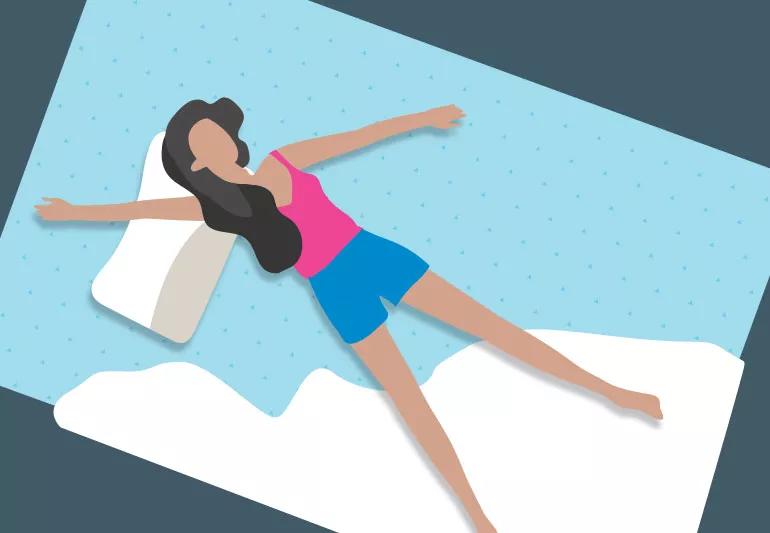Hormone therapy, medication and lifestyle changes and can help

Image content: This image is available to view online.
View image online (https://assets.clevelandclinic.org/transform/39c37ffa-8566-4e65-90fd-922e9a76bc07/night-sweats-menopause1-1189921156-770x533-1_jpg)
Woman suffering from night sweats while trying to sleep in bed.
Hormone therapy, medication and lifestyle changes and can help
Advertisement
Cleveland Clinic is a non-profit academic medical center. Advertising on our site helps support our mission. We do not endorse non-Cleveland Clinic products or services. Policy
You wake up in a pool of sweat, feeling like the heat somehow got cranked up to 100 degrees. Alas, the problem isn’t the furnace but your internal thermostat.
Surely you’re too young for hot flashes, right? Right?! Maybe not.
Most people who menstruate start having symptoms of perimenopause in their 40s. Those symptoms include irregular periods, vaginal dryness and, yes, hot flashes. As many as 3 in 4 people will have have hot flashes in the years leading up to menopause.
Women’s health specialist Pelin Batur, MD, shares tips for surviving these nocturnal trips to the tropics.
Scientists don’t know the exact reasoning behind flashes and night sweats, known as vasomotor symptoms, but they’re likely related to changes in hormone levels. When you enter menopause, your body starts producing less estrogen, a hormone that is secreted by the ovaries and regulates your menstrual cycle.
What is clear, though, is that hot flashes can be really, really unpleasant. You might feel like you’ve been swallowed by a heatwave, and you may sweat, turn red and feel your heart race. And while they’re an unwelcome experience any time of day, hot flashes can be especially troubling at night, when they mess with your sleep.
Advertisement
From a medical perspective, hot flashes aren’t necessarily worse at night — but they can feel like it, especially when they cause you to wake up drenched in sweat.
Hot flashes typically last only a few minutes, and they can also be followed by a bout of chills. By the time the whole ordeal is over, you may be wide awake and uncomfortable, not to mention soaking wet and kinda grossed out.
“If you’re not getting a good night’s sleep because of night sweats, then they become more than just a nuisance,” Dr. Batur says. “Really, it’s a quality-of-life issue.”
Menopause-related vasomotor symptoms aren’t dangerous. But if they’re interfering with your sleep or otherwise making you miserable, help is available.
“I think of it as a three-pronged approach: natural approaches, nonhormonal medicine approaches and hormonal approaches,” Dr. Batur says. She shares tricks and tips to keep night sweats to a minimum.
Certain foods or environmental triggers can spark night sweats.
“Some people report that increased intake of sugar, stress and caffeine may be contributors,” Dr. Batur notes. Other common triggers include:
Spend a few days tracking your hot flashes and what you did in the hours leading up to them. You might find that a eating spicy dinner or wearing flannel pajamas to bed are a recipe for night sweats.
Easier said than done, sure, but reducing your stress levels and practicing overall mindfulness can do wonders for your health in general — and it may lessen hot flashes, too. One study suggests that feeling anxious may be a good predictor of an incoming hot flash.
“The data for all of this is weak, but certainly it makes sense to try to minimize your stress, practice mindfulness and do some deep breathing,” Dr. Batur advises.
Take steps to turn your bedroom into a sweat-free sanctuary so that night sweats can’t get the best of you while you sleep.
If nighttime hot flashes are keeping you from sleep, your doctor can help. Their course of action will depend on your health conditions and concerns.
The U.S. Food and Drug Administration (FDA) has two nonhormal prescription medications specifically to treat vasomotor symptoms. Veozah™ (fezolinetant) is an oral medication that can help with moderate to severe hot flashes and night sweats due to menopause, while Brisdelle (paroxetine mesylate), an ultra-low dose of an old-fashioned antidepressant, is also specifically approved to treat hot flashes.
Advertisement
Other options may include:
Hot flashes can be a part of your life for months or even years. But if they’re getting in the way of your life, it’s time to seek treatment.
Plus, not all hot flashes are from menopause.
“They can also be related to thyroid disorders and other conditions or medications, so it’s especially important to get evaluated by your doctor,” Dr. Batur says.
They’ll work with you to determine the root cause and a course of action to improve your health and help you sleep through the night.
Advertisement

Sign up for our Health Essentials emails for expert guidance on nutrition, fitness, sleep, skin care and more.
Learn more about our editorial process.
Advertisement
What you should know and what you can do when your sheets get too soaked for comfort
Reaching menopause very early raises your risk of certain health conditions
Hormone changes can definitely leave you tossing and turning at night, but help is available
Your natural estrogen levels support a healthy heart by improving your cholesterol, increasing blood flow and reducing free radicals
Hormone changes may lead to sore breasts, but lifestyle changes can help
Medications and therapy can help get your groove back
Losing menopause weight may take more effort, but it’s doable
The not-so-sweet heat could be from a medical condition, menopause or even spicy foods
Type 2 diabetes isn’t inevitable with these dietary changes
Applying a hot or cold compress can help with pain
Pump up your iron intake with foods like tuna, tofu and turkey